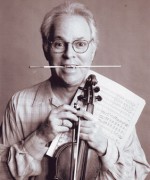Column Name
Title
Joel Smirnoff grew up on Manhattan’s West Side and attended the University of Chicago before earning both bachelor’s and master’s degrees at Juilliard. He joined the Juilliard String Quartet in 1986 and has been the ensemble’s first violin since 1997. A Juilliard faculty member since 1986, Smirnoff has chaired the violin department since 2000. He has conducted the Juilliard, San Francisco, and Phoenix Symphonies and the Saint Paul Chamber Orchestra, and is married to concert violinist Joan Kwuon, assistant Juilliard faculty.
Body
When did you first know you wanted to be a musician and how did you come to know it?
Both my parents were eminent musicians: my father, a violinist in the Stuyvesant Quartet, played with the NBC Symphony; my mother, a jazz singer, performed and traveled with the Jack Teagarden Band and appeared in Showboat on Broadway. Being musical was part of being in our family—it was only a question of entering the profession or not, and whether it was going to be jazz or classical music.
Who was the teacher or mentor who most inspired you when you were growing up?
There were a few. Ann Holden was the director and teacher of theory and music history at the School of Musical Education on 94th Street, which I attended every day after school from the age of 7. She had a unique way of teaching ear training—most of my students have been told about it, and it has been demonstrated to them. We were all writing fugues quite well by the age of 11! Also at 11, I studied with and got to hear Harry Glickman, former assistant concertmaster of the NBC Symphony and first violin of the WQXR String Quartet, weekly down at the New York Times building. Harry built my intonation and discipline. He gave me the complete Beethoven Quartet scores when I was 13, and demonstrated an inspired manner of leading a string quartet. Also when I was about 13, Peter Flanders, a doctoral candidate in musicology at Columbia, asked me to be part of a project of reading and rehearsing all of the Haydn quartets. What a fantastic experience! Every Friday for two years, we traversed this musical “bible.” The other players included harpsichordist Kenneth Cooper, who was our second fiddle. I learned to combine thinking and playing in this “sink or swim” situation, with political discussion and brownies concluding each evening.
What was the first recording that you remember hearing or buying?
I felt very close to Brahms as a young person. Bruno Walter’s recording of the First Symphony with the New York Philharmonic was my very first love. I only owned it recently, but I borrowed it frequently from the N.Y. Public Library as a young person.
What’s the most embarrassing moment you’ve had as a performer?
Our quartet was playing downtown at Washington Irving High School, and I had left my metronome in my pocket. It started ticking during our very first bars of the opening Mozart Quartet. Of course, the audience thought it was a cell phone—and it made The New York Times. Actually, it turned into a cute P.R. story that you could never buy!
If you could have your students visit any place in the world, where would it be, and why?
For me, great libraries hold out a great sense of hope. I think a trip to the New York Public Library is a subway ride worth much more than its cost.
What are your non-music related interests or hobbies?
My wife and I read, go to the movies, and we are both dog lovers. Dogs are so very forgiving. And I still admire written histories that are relevant to our present world. I’m an awful golfer who loves the game, and Joan and I are both big nature and sports fans.
If your students could only remember one thing from your teaching, what would you want it to be?
It’s hard to single out one element. One has to remember at all times that what we do in the practice room and the studio only prepares us for the stage. I find more and more that violin teaching is often the re-teaching of basic musical values.
What is your favorite thing about New York City?
It’s the place where I met my wife! I enjoy the quick-wittedness of New Yorkers and the relative sophistication of its inhabitants—and it is the home of Carnegie Hall.
If you weren’t in the career you are in, what would you be doing?
I would most likely be a teacher of some other kind. Or, here is a list off the top of my head: criminologist, baseball player, golfer, historian, ballet dancer, school teacher, bus driver, medical researcher.
What book are you reading right now? Or what CD are you listening to?
Most recently, Just and Unjust Wars by Michael Walzer and Iron John by Robert Bly. My wife and I have been endlessly listening to the recordings Heifetz made for Decca during 1944 and 1945—so inspired and masterful!





